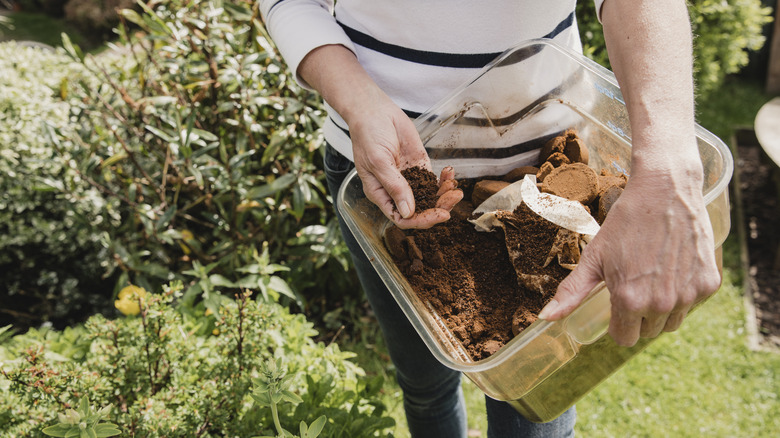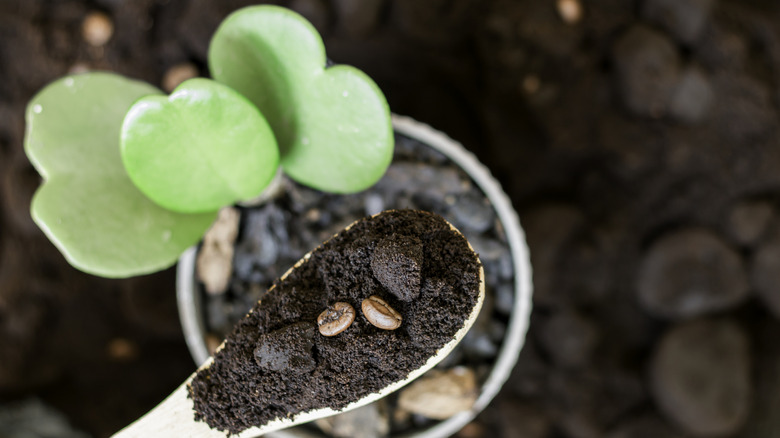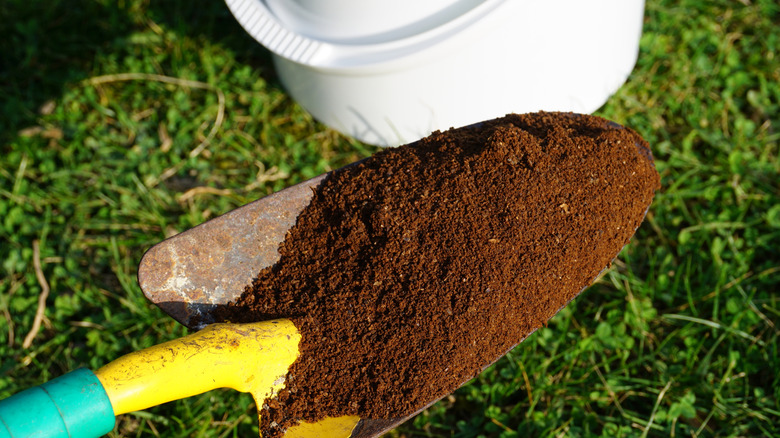Boost Your Lawn's Health The Budget-Friendly Way With Coffee Grounds
American coffee drinkers go through an average of three cup each day, and those used coffee grounds often end up in the trash. But instead of tossing them, you can give your lawn a boost. Coffee grounds are packed with nutrients like nitrogen, phosphorus, potassium, and magnesium — exactly what your grass needs to grow greener and stronger. As a bonus, the grounds can help regulate soil temperature, keeping roots a little more comfortable during summer heat or chilly snaps.
As the coffee grounds break down, they slowly release nutrients into the soil, feeding your lawn without the risk of burning it like some chemical fertilizers. The nitrogen helps your grass grow thick and green, while phosphorus and potassium work behind the scenes to strengthen roots and help the lawn bounce back from stress. Plus, the extra organic matter improves the soil's structure, giving roots a better place to grow. For an extra boost, you can still pair this effective plant food with a bit of organic fertilizer to keep everything thriving.
Lawns amended with coffee grounds retain water better and recover faster from dry periods than those treated with peat moss or sand alone. These grounds also support beneficial soil microbes, which help break down organic material and release nutrients in forms that plants can absorb. Plus, coffee grounds offer small but helpful amounts of micronutrients like calcium, iron, and zinc, giving your lawn an additional, natural boost.
Coffee grounds can naturally deter common lawn pests
Besides nourishing your lawn, coffee grounds can help keep certain pests at bay. The grainy texture of spent grounds is unpleasant for soft-bodied pests like slugs and snails, and the natural compounds found in coffee, including caffeine and diterpenes, have been shown to act as mild insecticides. While most of us enjoy the scent of fresh coffee, many insects find the strong aroma a bit too much and stay away.
When burned, coffee grounds give off a strong, smoky scent that some gardeners swear helps keep mosquitoes, beetles, and flies away. The smell may irritate pests or even mask the scents that usually draw them in, though results aren't always consistent. You'll likely need to reapply after rain or windy weather. And while coffee grounds are helpful, they're not foolproof – piling them too thick can attract ants instead. As with most natural remedies, it works best as a gentle, eco-friendly option for gardeners who want to deter pests without reaching for chemical sprays.
Application tips for coffee grounds in the yard
When using coffee grounds to boost lawn health, sprinkling is the easiest and most practical method. Simply spread a thin, even layer over your lawn, focusing on problem spots or areas that need a nutrient boost. Let your sprinkler or the next rainfall gently work the grounds into the soil. This slow infusion helps release nutrients without overwhelming your grass. Avoid clumping or piling the grounds, as that can create water-repellent mats and attract pests like ants.
If you're storing used coffee grounds, put them in a sealed container until you're ready to use them. If mold forms, don't worry, they're still safe to compost. Coffee grounds can also be used to form light pest-deterring barriers around garden beds, doors, or windows. For best results, always apply sparingly and reapply with consistency. For a more direct application, you can also try a DIY caffeine spray. Just mix a cup of water with 2 cups of strong, brewed coffee.
If you want to turn coffee into a simple plant spray, mix 9 cups of water with 1 cup of brewed coffee. Before you spray the whole lawn or garden, it's better to test it on a small patch first. After a few sunny days, check to see if the leaves handled it well. If there's no sign of damage or leaf burn, you're safe to treat the rest of your dying house plants or garden.


